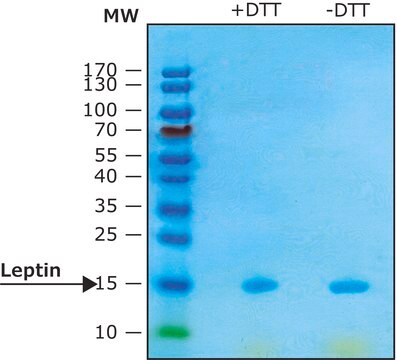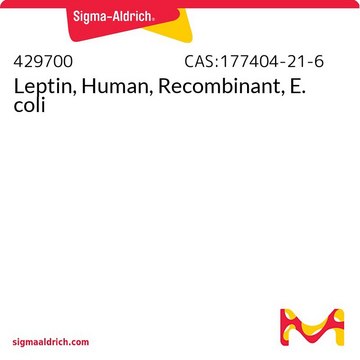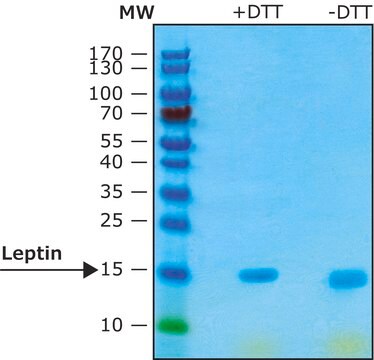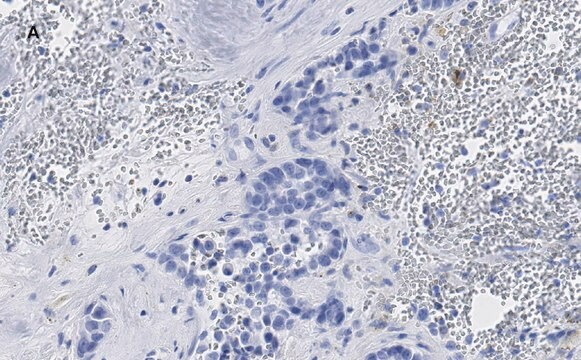L3772
Leptin from mouse
≥98% (SDS-PAGE), recombinant, expressed in E. coli, lyophilized powder
Synonyme(s) :
OB
About This Item
Produits recommandés
Source biologique
mouse
Niveau de qualité
Produit recombinant
expressed in E. coli
Stérilité
non-sterile
Pureté
≥98% (SDS-PAGE)
Forme
lyophilized powder
Puissance
≤1.0 ng/mL ED50
Poids mol.
predicted mol wt ~16 kDa
Conditions de stockage
OK to freeze
Technique(s)
cell based assay: suitable
Impuretés
≤1.0 EU/μg endotoxin
Numéro d'accès UniProt
Conditions d'expédition
ambient
Température de stockage
−20°C
Chaîne SMILES
CC(C)CC(C(=NC(CCC(=N)O)C(=NCC(=NC(CO)C(=NC(CC(C)C)C(=NC(CCC(=N)O)C(=NC(CC(=O)O)C(=NC(CCSC)C(=NC(CC(C)C)C(=NC(CC1=CNC2=CC=CC=C21)C(=NC(CCC(=N)O)C(=NC(CC(C)C)C(=NC(CC(=O)O)C(=NC(CC(C)C)C(=NC(CO)C(=O)N3CCCC3C(=NCC(=NC(CS)C(=O)O)O)O)O)O)O)O)O)O)O)O)O)O)O)O)O)O)N
InChI
1S/C87H138N22O28S2/c1-41(2)27-48(88)72(121)97-50(18-21-65(89)112)73(122)93-36-68(115)95-61(38-110)84(133)104-54(28-42(3)4)77(126)98-52(20-23-67(91)114)75(124)106-59(33-70(117)118)82(131)100-53(24-26-139-11)76(125)102-55(29-43(5)6)78(127)105-58(32-46-35-92-49-16-13-12-15-47(46)49)81(130)99-51(19-22-66(90)113)74(123)101-56(30-44(7)8)79(128)107-60(34-71(119)120)83(132)103-57(31-45(9)10)80(129)108-62(39-111)86(135)109-25-14-17-64(109)85(134)94-37-69(116)96-63(40-138)87(136)137/h12-13,15-16,35,41-45,48,50-64,92,110-111,138H,14,17-34,36-40,88H2,1-11H3,(H2,89,112)(H2,90,113)(H2,91,114)(H,93,122)(H,94,134)(H,95,115)(H,96,116)(H,97,121)(H,98,126)(H,99,130)(H,100,131)(H,101,123)(H,102,125)(H,103,132)(H,104,133)(H,105,127)(H,106,124)(H,107,128)(H,108,129)(H,117,118)(H,119,120)(H,136,137)/t48-,50-,51-,52-,53-,54-,55-,56-,57-,58-,59-,60-,61-,62-,63-,64-/m0/s1
Clé InChI
NRYBAZVQPHGZNS-ZSOCWYAHSA-N
Informations sur le gène
mouse ... Lep(16846)
Description générale
Leptin (Ob) is a non-glycosylated polypeptide hormone. It is produced primarily in adipocytes and the placenta. The structure of leptin closely resembles members of the long-chain helical cytokine family. It is composed of four antiparallel α-helices interconnected by two long crossover links and one short loop. These structural elements are arranged in a left-handed helical bundle formation, resulting in a unique two-layer packing configuration.
Application
- to check the effect of leptin on ovulation for treating infertility in obese mice
- to check the effect of leptin on MGARP (mitochondria-localized glutamic acid-rich protein) expression in testis and follicular granular cells of mice
- to study the morphometrical changes in mouse testicular tissue upon long term exposure to leptin
Actions biochimiques/physiologiques
Human and mouse leptin share ~84% sequence identity.
Forme physique
Remarque sur l'analyse
Code de la classe de stockage
11 - Combustible Solids
Classe de danger pour l'eau (WGK)
WGK 3
Point d'éclair (°F)
Not applicable
Point d'éclair (°C)
Not applicable
Équipement de protection individuelle
Eyeshields, Gloves, type N95 (US)
Certificats d'analyse (COA)
Recherchez un Certificats d'analyse (COA) en saisissant le numéro de lot du produit. Les numéros de lot figurent sur l'étiquette du produit après les mots "Lot" ou "Batch".
Déjà en possession de ce produit ?
Retrouvez la documentation relative aux produits que vous avez récemment achetés dans la Bibliothèque de documents.
Les clients ont également consulté
Articles
Lipid Induced Insulin Resistance
Notre équipe de scientifiques dispose d'une expérience dans tous les secteurs de la recherche, notamment en sciences de la vie, science des matériaux, synthèse chimique, chromatographie, analyse et dans de nombreux autres domaines..
Contacter notre Service technique











